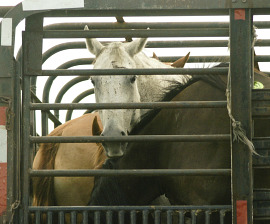This comes from my friend RT Fitch and his blog Straight From The Horses Heart. More applications to open horse slaughter plants have been discovered by Front Range Equine Rescue! ~Declan
Breaking News: FRER Discovers New Applications for Horse Slaughter Facilities
Posted: March 13, 2013 by R.T. Fitch in Horse News, Horse Rescue, Horse SlaughterTags: Equine, Food and Drug Administration, Food Safety and Inspection Service, Horse, Horse Slaughter, horsemeat
“We will investigate each and every new facility…where these misguided attempts to kill American horses have been made.”
 LARKSPUR, COLORADO – Front Range Equine Rescue (FRER) has received copies of four previously undiscovered applications for new horse slaughter plants – in Tennessee, Missouri, Oklahoma and Iowa – bringing the number of pending applications to six. Two of the applications are over nine months old, despite longstanding official denials about any more new applications. The Food Safety and Inspection Service (FSIS), which inspects animals and meat in American slaughterhouses under the auspices of the U.S. Department of Agriculture, has stated that the American beef supply is safe from adulteration with horse meat only because horses are not slaughtered in America. If horse slaughter does begin again in America, the entire American meat supply is threatened with contamination. The proposed plants are in Tennessee, Oklahoma, Iowa, and Missouri.
LARKSPUR, COLORADO – Front Range Equine Rescue (FRER) has received copies of four previously undiscovered applications for new horse slaughter plants – in Tennessee, Missouri, Oklahoma and Iowa – bringing the number of pending applications to six. Two of the applications are over nine months old, despite longstanding official denials about any more new applications. The Food Safety and Inspection Service (FSIS), which inspects animals and meat in American slaughterhouses under the auspices of the U.S. Department of Agriculture, has stated that the American beef supply is safe from adulteration with horse meat only because horses are not slaughtered in America. If horse slaughter does begin again in America, the entire American meat supply is threatened with contamination. The proposed plants are in Tennessee, Oklahoma, Iowa, and Missouri.
These applications demonstrate that profiteers ignore all warning signs in the quest for financial gain, even when their efforts endanger consumers, necessitate horrific cruelty, and register gross disrespect for this iconic species so well loved by most Americans. FRER has already established in formal legal filings that horse meat from American horses is a toxic stew, that there is no humane way for a horse to be slaughtered for consumption, and that the environmental effects of a horse slaughter plant can be devastating to local communities and citizens. FRER has proven that there is no way to safely produce horse meat, and highlighted the tragedy of companion, race, and wild horses ending their lives on a meat hook in detailed legal filings with USDA, the Food and Drug Administration, and the Bureau of Land Management.
FRER is dedicated to stopping the reinstitution of horse slaughter, and eighty percent of the American public agrees that horse slaughter should be banned. According to FRER’s President Hilary Wood, “FRER will carry out its public campaigns and legal work for as long as it takes to eliminate the possibility of horse slaughter in America. We will investigate each and every new facility, and will come to the aid of horse-loving citizens in towns like Gallatin, Missouri(Rains Natural Meats), Woodbury, Tennessee (Trail South Meat Processing), Washington, Oklahoma (Oklahoma Meat Co.), and Sigourney, Iowa (Responsible Transportation), where these misguided attempts to kill American horses have been made.”
Despite the financial woes of the federal government, and despite the undeniable truth about the suffering and adulteration of horse meat inherent in horse slaughter, FSIS and the USDA seem to be favorable to this unseemly business endeavor. While FSIS has the power to deny or delay the review of these applications, its recent conduct suggests it is shirking its public responsibility in preference to these unwanted operations, which serve only those who make money on the brutal death of American horses.
Ms. Wood added, “The slaughterers have misled the public and public servants into thinking horse slaughter is necessary and humane, when it is anything but. All American horses can be supported by public programs imposing limits on overbreeding, as well as those by FRER and similar groups that subsidize sterilizations, necessary euthanasia, and offer re-homing guidance. We encourage Americans who love horses to step up to protect the animals they love, rather than letting them endure a prolonged trip to a brutal and horrible end to be served on a foreign dinner plate.”
No comments:
Post a Comment